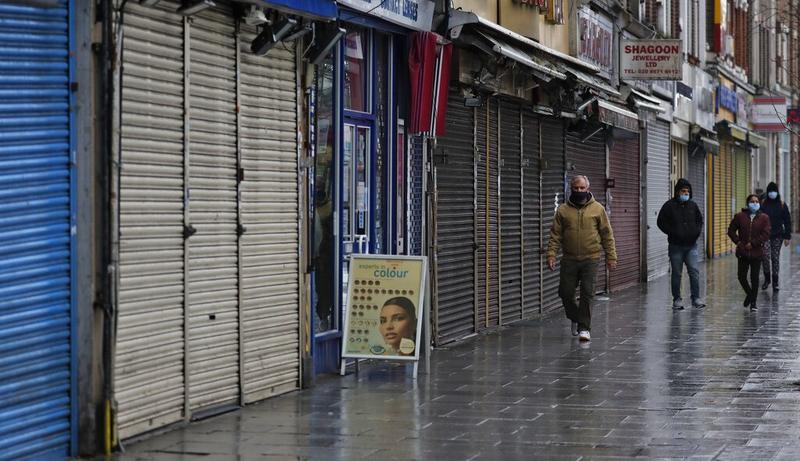 People walk past closed stores in London, Britain, on Jan 16, 2021 amid England's third national lockdown since the coronavirus outbreak began. (FRANK AUGSTEIN / AP)
People walk past closed stores in London, Britain, on Jan 16, 2021 amid England's third national lockdown since the coronavirus outbreak began. (FRANK AUGSTEIN / AP)
An analysis by the United Kingdom's largest labor organization, the Trades Union Congress, or TUC, suggests black and minority ethnic, or BME, workers have been hit hardest by job losses during the novel coronavirus pandemic.
The federation's study of official data found that one in 12 BME workers are now unemployed, compared to just one in 22 of white workers.
Research showed the employment rate for people from BME backgrounds has dropped 5.3 percent over the last year, which is 26 times the fall in the rate for those from white backgrounds, ITV News reported.
Minority workers are more likely to work in hard-hit industries like hotels and food services, the TUC study noted. Within those sectors, "BME workers have been more likely to lose their jobs than their white colleagues".
An analysis by the UK's largest labor organization found that one in 12 workers of black and minority ethnic are now unemployed, compared to just one in 22 of white workers
Data from the Office for Budget Responsibility showed the overall unemployment rate in the UK is expected to peak at about 7.5 percent sometime between April and June, London's Evening Standard newspaper reported.
ALSO READ: 2m UK jobs seen going after furlough scheme ends
But figures between July and September 2020 showed 8.5 percent of BME people were out of work, compared to 7 percent a year earlier. The Guardian noted that in total, more than 800,000 workers have been made redundant during the pandemic.
The TUC called on the government to urgently address structural racism in the workplace.
"The time for excuses and delays is over," TUC general secretary Frances O'Grady was quoted as saying by multiple British news outlets. "This pandemic has held up a mirror to discrimination in our labor market.
"In every industry where jobs have gone, BME people have been more likely to be made unemployed."
Sector differences
The analysis revealed that even when broken down by sectors, BME workers have suffered more than their white counterparts.
"In some sectors like hospitality, retail and the arts, BME employment has literally plummeted," said O'Grady. "And when BME workers have held on to their jobs, we know that they are more likely to be working in low-paid, insecure jobs that put them at greater risk from the virus."
She added: "Ministers must challenge the systemic racism and inequality that holds back BME people at work."
READ MORE: New initiatives needed to shore up UK jobs, business group says
Quoted in the Standard, Patrick Roach, chair of the TUC's anti-racism task force, said: "We have seen evidence of widening inequality during the pandemic-both because of the virus and because of the impact of the government's emergency measures.
"During previous economic downturns, BME workers have been 'first out and last in'. The government needs to address the causes and effects of structural racism and set out a national recovery plan that works for everyone."
The government is due to announce how it will deal with job losses related to the pandemic. It is expected to unveil plans for the expansion of student loans, meaning adults can use them to fund technical courses as well as undergraduate degrees.
jonathan@mail.chinadailyuk.com


